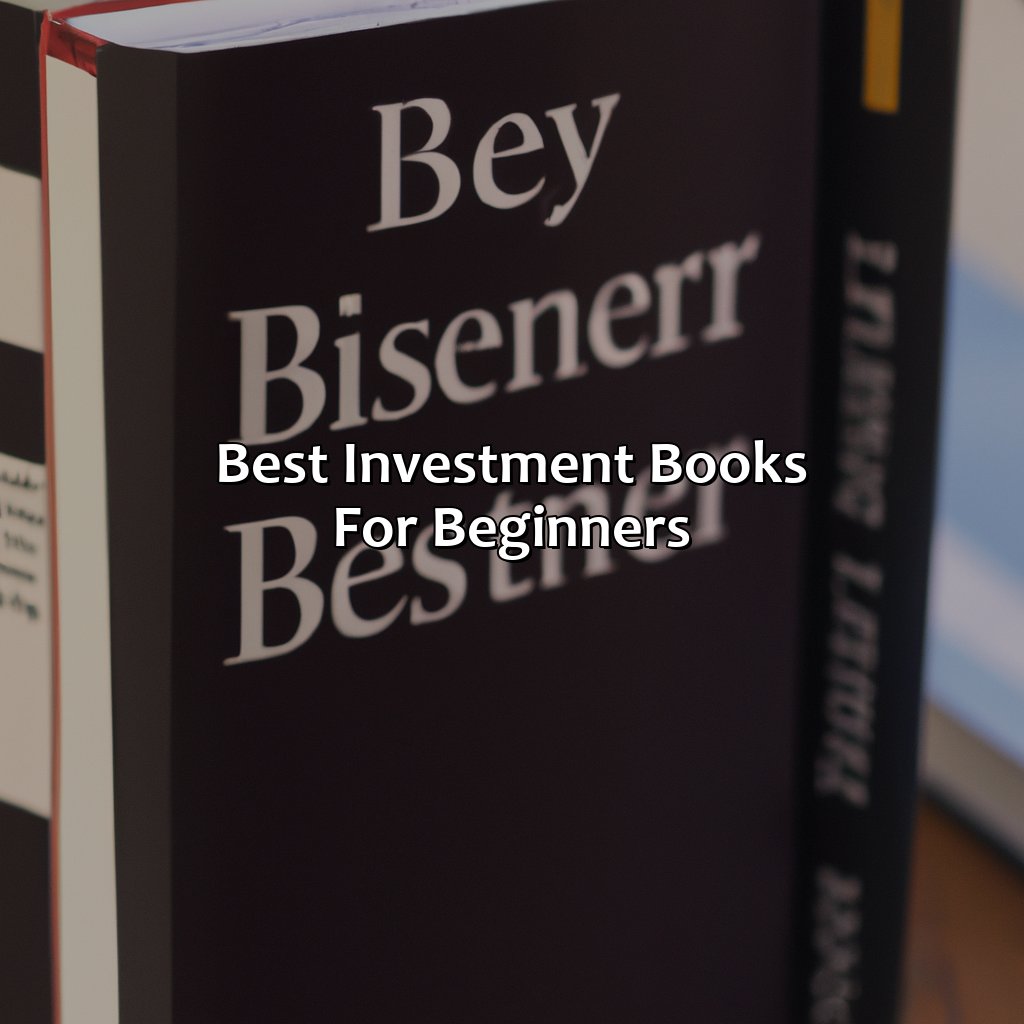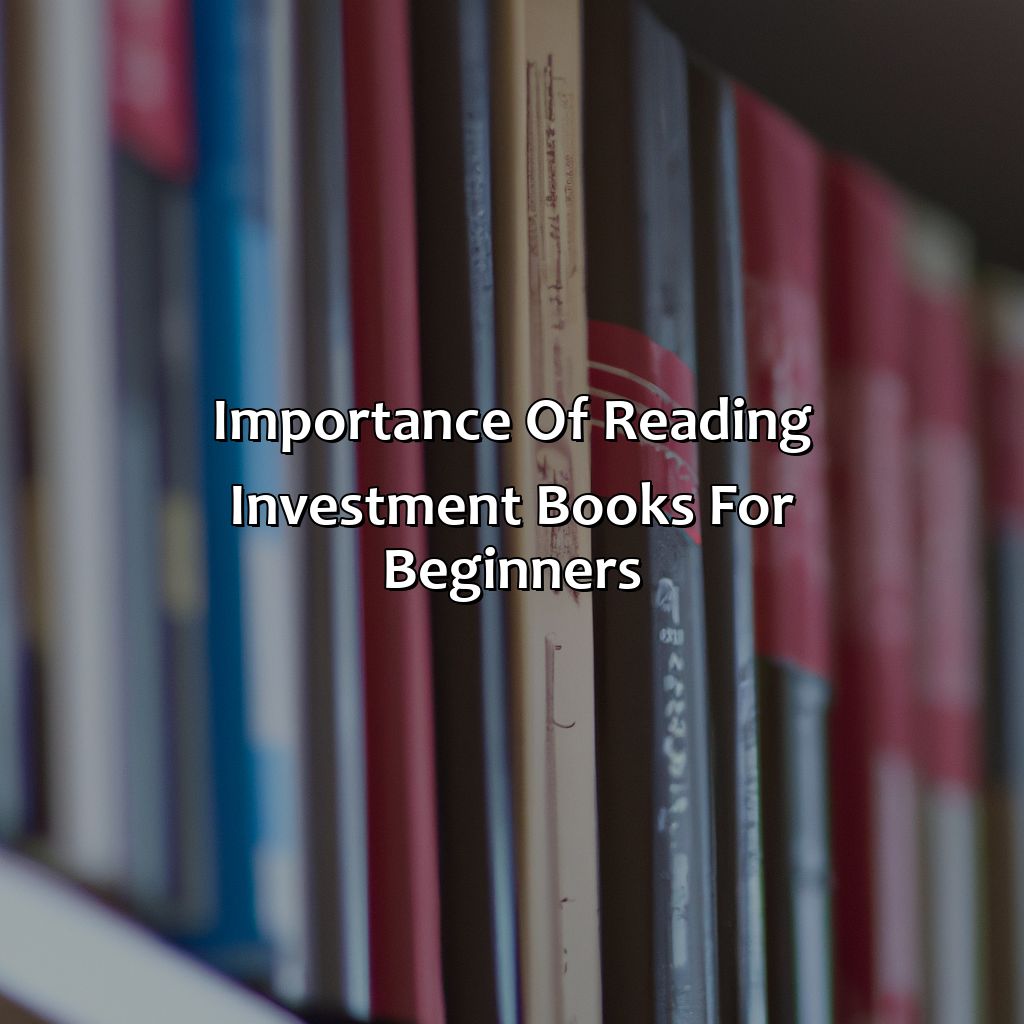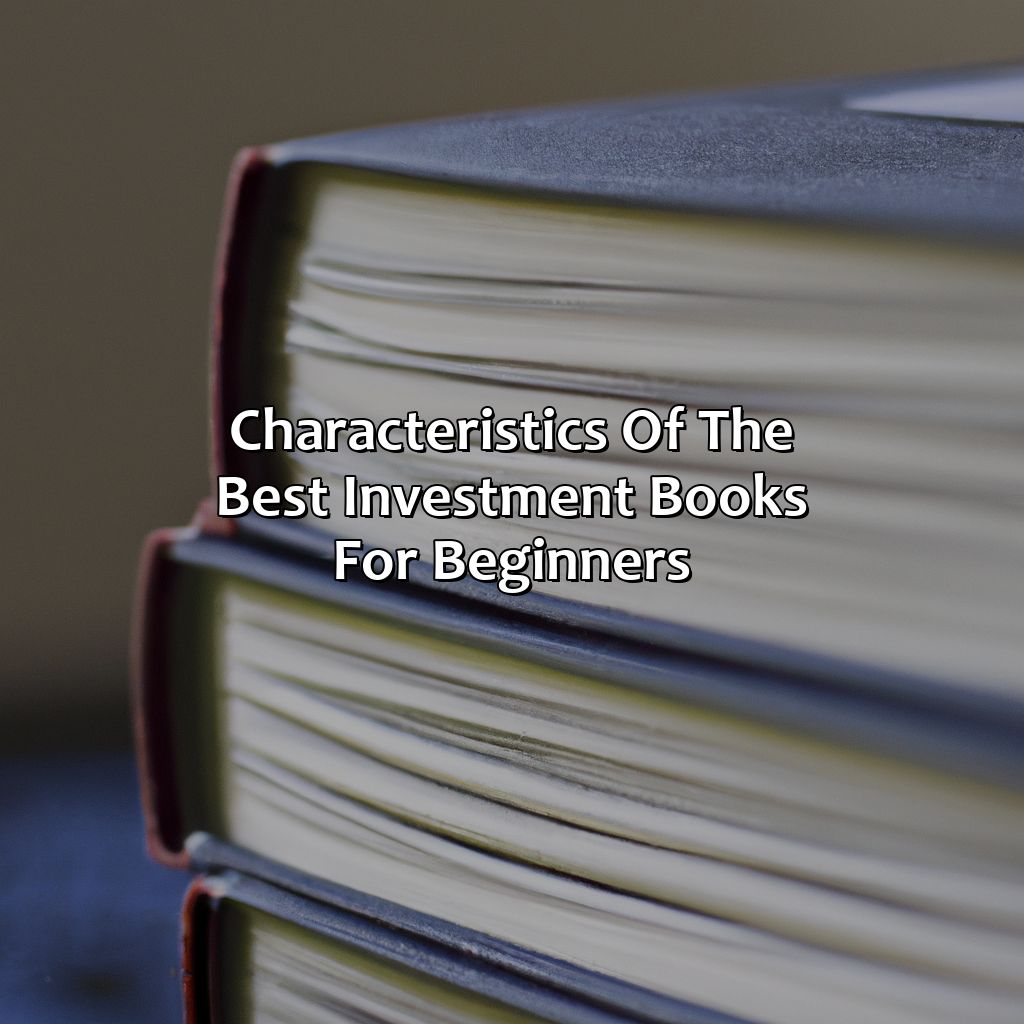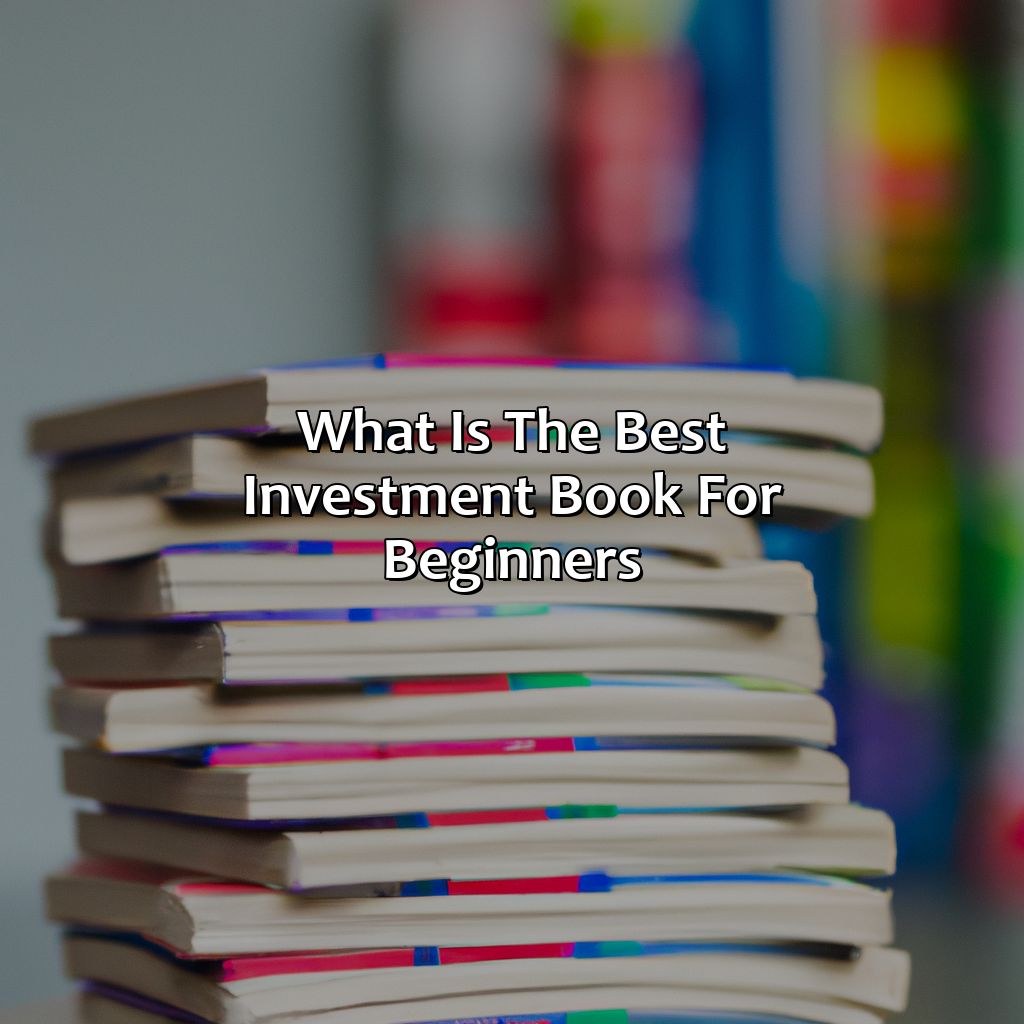What Is The Best Investment Book For Beginners?
Key Takeaways:
- Investment books offer valuable guidance for beginners: Reading investment books can provide a solid foundation for individuals looking to begin investing. Books offer a well-organized structure and expert advice, helping readers make informed decisions.
- The best investment books are clear, actionable, and informative: The best investment books provide clear and concise information in a simple and easy-to-understand manner. They offer actionable advice that readers can apply to their investment portfolios and provide insights on risk management.
- The top 5 investment books for beginners are: The Intelligent Investor, A Random Walk Down Wall Street, The Little Book of Common Sense Investing, The Bogleheads’ Guide to Investing, and The Simple Path to Wealth. These books cover a range of topics and offer practical advice for investors of all levels.
Are you a beginner interested in learning how to invest? Look no further than this article which reviews the best investment books for new investors. You’ll find all the detailed advice and information you need to start investing wisely and confidently.
Best Investment Books for Beginners
Investing is a crucial aspect of financial growth, and beginners need the right resources to guide their decision-making. Here are some recommended investment books for beginners:
- “The Intelligent Investor” by Benjamin Graham: This classic offers a comprehensive overview of value investing and helps readers make sound investment decisions.
- “A Random Walk Down Wall Street” by Burton Malkiel: This book explains the basics of investing in a simple, straightforward way, making it ideal for new investors.
- “The Little Book of Common Sense Investing” by John C. Bogle: This book emphasizes the importance of low-cost index funds and provides practical guidance for investors.
It’s also important to note that each investor has unique goals and needs, and it’s essential to choose a book that aligns with one’s objectives and interests.
Interestingly, many successful investors attribute their success to reading and implementing the strategies shared in investment books. For example, Warren Buffett, one of the world’s most successful investors, claims that “The Intelligent Investor” played a pivotal role in shaping his investing philosophy.

Image credits: retiregenz.com by Harry Arnold
Importance of Reading Investment Books for Beginners
For novice investors, reading investment books can be pivotal in shaping their investment opportunities and strategies. These books offer valuable information on investment basics, provide insights into the market, and suggest methods to maximize returns. As beginners, one can learn about investment terminologies, asset allocation, and risk management practices. By studying the past strategies and experiences of successful investors, beginners can get a better grasp of how the market functions and make informed decisions.
Delving deeper, investment books explore various categories of investments like stocks, bonds, mutual funds, and ETFs. These books educate readers on how they function, their benefits and drawbacks, and how they fit into a broader portfolio. Notably, these books offer diverse perspectives by different authors, and as a result, one can get a more holistic view of investing. It is critical to highlight that reading investment books should not replace seeking professional financial advice. Instead, it should help investors to ask the right questions and enhance their research skills.
Reading investment books has always been crucial in the investment world. The famous book, The Intelligent Investor, by Benjamin Graham, is considered a must-read for all investors. The book is renowned for its strategies on defensive investing and identifying intrinsic value in the market. Similarly, The Little Book of Common Sense Investing by John Bogle, teaches a step-by-step guide on investing in low cost indexed funds and the benefits that come with it. These books have played a critical role in shaping the investment mindset of many investors, making them essential to any beginner’s reading list.

Image credits: retiregenz.com by Harry Washington
Characteristics of the Best Investment Books for Beginners
Choose an investment book wisely! It should have clear and simple content, for easy understanding. Look for one that offers useful advice. Get a book that has practical steps to help you make the right decisions. Additionally, it should give info about risk management, to reduce losses.

Image credits: retiregenz.com by James Washington
Clarity and Simplicity of Content
Investment books for beginners should have comprehensible and straightforward content without jargons or complexities. The clarity and simplicity of the language used in the book are crucial elements in ensuring readers understand the concepts therein. Clear information enables readers to make sound investment decisions, avoiding misinterpretations or confusion.
A clear and concise structure that highlights key points can also simplify comprehension. Additionally, visual aids such as infographics and illustrations complement the text’s clarity by providing a descriptive representation of abstract ideas. Beginner readers’ ability to understand financial terminology increases when it is presented in relatable format.
Further to this, authors with experience in delivering investment knowledge can explain complex concepts with ease through simple analogies and real-world examples that novice investors can relate to quickly. Authors can use conversational tones instead of technical jargon that is unknown to most readers.
Reading investment books without actionable advice is like trying to learn how to swim by reading a book on water.
Offers Actionable Advice
Investment books for beginners that provide applicable solutions on how to invest money will encourage your growth in the ever-changing financial world. These books offer strategic plans and advice and vary in difficulty and degree. They may cover a wide range of subjects, including stock markets, bonds, real estate, mutual funds, and more.
An excellent investment book for beginners offers practical guidance on how to develop a solid investment strategy and stick to it. It teaches readers how to conduct thorough research on stocks and enables them to distinguish between top-performing companies from others. Such books include hands-on experience with investing, asset allocation techniques, risk management strategies, investment psychology concepts.
Furthermore, some noteworthy features of the best investment books for beginners are their clear writing style that avoids technical jargon and covers topics using relatable analogies. Additionally, the best titles tend to be updated regularly; they incorporate the latest investing trends and frequently asked questions by new investors.
Don’t miss out on an opportunity to educate yourself about investing’s ins and outs; you could benefit from it for years to come. Start reading one of these highly recommended beginner investment books today!
“Learning about risk management is like wearing a seatbelt while driving – it may not completely prevent disaster, but it can certainly lessen the impact.”
Provides Insight on Risk Management
Understanding and managing risks is a crucial aspect of successful investing, especially for beginners. A quality investment book for beginners will provide a comprehensive insight into the various risks investors may face and how to manage them.
Such books might cover topics like diversification, standard deviation, and asset allocation. They should also provide practical examples and case studies to help readers understand how to apply risk management principles in real-life situations.
Furthermore, investment books could discuss different types of investment products, such as stocks, bonds, commodities, and cryptocurrencies – each with their unique risk factors. Therefore, beginners need to study these variables before starting their investment journey.
Pro Tip: Beginners must research the author’s background and qualifications before buying an investment book for added assurance about the validity of the information provided.
Get ready to invest your time wisely with these top 5 books that will turn your beginner status into a financial guru in no time:
Top 5 Best Investment Books for Beginners
Investing made easy! Ready to get into the exciting world of investing? Check out this curated list of the top 5 investment books:
- The Intelligent Investor
- A Random Walk Down Wall Street
- The Little Book of Common Sense Investing
- The Bogleheads’ Guide to Investing
- The Simple Path to Wealth
These books are ready to help you find the literature that is right for you. Start investing today!

Image credits: retiregenz.com by Yuval Duncun
The Intelligent Investor
This book is considered one of the most influential finance books ever written, offering opportunities to maximize returns while avoiding risks. It provides insights into long-term strategies and effective techniques for wealth management with a value-oriented yet safety-oriented approach.
The author emphasizes the importance of diversification, fundamental analysis, risk evaluation, and patience. The book accomplishes this by using examples of case studies from the stock market and providing valuable historical perspectives on financial crises that influenced investor behavior in the past.
Uniquely, the fourth edition features commentary provided by Jason Zweig about modern-day scenarios applied to Graham’s principles. Readers can leverage this section to understand how long-term investment strategies may be implemented in current economic conditions.
The book was first published in 1949, its prophetic insights later validated when their strategy proved resilient during the 1973-74 recession. The Intelligent Investor has since influenced generations of investors fighting to balance their hubristic impulses with rational business sense.
Prepare for a rollercoaster ride through the unpredictable world of stocks with ‘A Random Walk Down Wall Street’ – the perfect book for beginners. #InvestingHumor
A Random Walk Down Wall Street
Investing in the stock market can be intimidating for beginners. ‘A Stroll Along Wall Street‘ teaches new investors about the basics of investing and how to make sound investment decisions using a simple and realistic approach. It explains why it is better to follow a passive investment strategy rather than actively managing your investments.
The book simplifies complex financial concepts, making it accessible for beginners. The author also talks about behavioural biases that can hinder investment success and ways to avoid them. Overall, this book provides a comprehensive guide on how to build wealth by investing in low-cost index funds.
When reading ‘A Stroll Along Wall Street‘, readers will learn about portfolio diversification and asset allocation techniques. They will understand the difference between risk and volatility when investing and be able to construct their portfolios accordingly.
Moreover, this book also offers practical advice on what to do in different market conditions, such as bear or bull markets. It emphasizes taking a long-term approach rather than trying to time the market.
According to The New York Times, ‘A Stroll Along Wall Street‘ has been “the most entertaining book written on investing” while remaining informative and educational – a perfect fit for beginners seeking expert guidance without boredom induced by jargon-laced texts.
If you’re looking for a book that tells you to invest in the latest fad, this ain’t it – ‘The Little Book of Common Sense Investing‘ is all about the tried-and-true strategy of index funds.
The Little Book of Common Sense Investing
This investment book, written by John C. Bogle, is a must-read for beginner investors seeking long-term success. The Little Book outlines a simple and practical approach to investing that emphasizes low cost, broad diversification, and a buy-and-hold strategy. By implementing these strategies, investors can minimize risks and maximize returns over time.
The Little Book of Common Sense Investing teaches readers about the potential advantages of index funds and the importance of keeping investment costs low. Bogle argues that actively managed funds often underperform in the long run compared to index funds due to high fees and transaction costs.
Additionally, this book helps readers understand the importance of setting realistic investment goals and sticking to them through market ups and downs. By developing a disciplined approach to investing and avoiding impulsive decisions based on emotions or short-term trends, investors can achieve their financial objectives.
Beginners who read The Little Book of Common Sense Investing will gain valuable insights into how stock markets work and how they can build diversified portfolios. Moreover, they will learn how being patient and consistent pays off in the long run. This is especially relevant for those who may be intimidated by complex financial jargon or overwhelmed by endless investment options.
Based on the principles outlined in this book, beginners should consider investing in low-cost index funds or exchange-traded funds (ETFs). These provide easy access to broad market exposure at minimal costs thereby reducing risk compared to buying individual stocks. By following Bogle’s commonsense advice with patience and diligence, beginners can grow their wealth steadily over time with lower levels of stress as compared to actively trading stocks on a daily basis.
Investing can seem complicated, but The Bogleheads’ Guide makes it so simple even your cat could do it (if your cat had opposable thumbs).
The Bogleheads’ Guide to Investing
This investment book for beginners offers a comprehensive overview of the investment strategies used by the Bogleheads. The “Guide to Investing” contains practical tips and advice on how to maximize returns while minimizing risk in a range of different investment scenarios. With its clear, concise language and easy-to-understand examples, this book is an excellent resource for anyone looking to embark on an investment journey.
The Bogleheads’ principles are based on sound financial strategies, including the use of low-cost funds, diversification, and asset allocation. Through its clear, well-written chapters, “The Guide To Investing” explains these principles in detail and provides readers with the tools they need to make informed decisions about their investments.
Unique details include advice on selecting the right broker or fund manager; understanding different kinds of investment vehicles; and determining which types of investments are likely to deliver the best results given your goals and risk tolerance.
A personal story: Before reading this book, I was overwhelmed by investment jargon and unsure where to start. But after diving into “The Guide To Investing,” I felt empowered to take control of my financial future. Thanks to the Bogleheads’ approach, I’m now more confident making educated choices about my investments.
The Simple Path to Wealth
Investing in the stock market can be overwhelming for beginners. However, a strategic approach can pave “A Clear Route to Riches“. Andrew Hallam’s ‘The Simple Path to Wealth‘ is a must-read book for novices to learn about investing that centers around simple and effective strategies. The author guides readers through investment portfolios suitable for any investor with its easy-to-understand language.
Hallam approaches investment with simplicity using relatable metaphors such as the simple potato farm, which simplifies the concepts of diversification, low-cost funds, and compounding. He expresses that individuals need not be wealthy or experts to invest their money efficiently. The book serves as an in-depth guide on how investors should think when buying stocks, bonds or a mixture of both.
In addition to his unique approach and literary style, Andrew uses real-life examples that make the content even more engaging. One example focuses on how a school teacher made savvy investments leading her to retire before the age of forty-four. Andrew emphasizes caution while teaching investors how not to fall into expensive pitfalls.
Don’t miss out, grab yourself a copy of ‘The Simple Path to Wealth‘ and experience anxiety-free investing while accumulating wealth over time.
Five Facts About the Best Investment Book for Beginners:
“The Intelligent Investor” by Benjamin Graham is considered the best investment book for beginners. (Source: Investopedia)
The book emphasizes the importance of value investing and teaches readers how to avoid common investing pitfalls. (Source: Business Insider)
Warren Buffett has credited “The Intelligent Investor” as a key influence on his investment strategy. (Source: The Motley Fool)
Other popular investment books for beginners include “The Little Book of Common Sense Investing” by John C. Bogle and “The Simple Path to Wealth” by JL Collins. (Source: Forbes)
Reading investment books can help beginners build a solid foundation of knowledge and make informed investment decisions. (Source: The Balance)
FAQs about What Is The Best Investment Book For Beginners?
What is the best investment book for beginners?
There are many great investment books for beginners, but one that is highly recommended is “The Bogleheads’ Guide to Investing” by Taylor Larimore, Mel Lindauer, and Michael LeBoeuf. This book provides practical advice on how to build a low-cost, diversified portfolio using index funds.
What makes “The Bogleheads’ Guide to Investing” the best investment book for beginners?
“The Bogleheads’ Guide to Investing” is written in a clear and easy-to-understand manner. The authors explain complex investing concepts in simple language and provide step-by-step guidance on how to get started with investing. Additionally, the book emphasizes the importance of having a long-term investing strategy and avoiding costly mistakes.
Are there any other investment books for beginners that are worth reading?
Yes, there are several other investment books for beginners that are worth reading. “The Intelligent Investor” by Benjamin Graham is a classic that provides timeless advice on value investing. “A Random Walk Down Wall Street” by Burton Malkiel is also a great book that explains the benefits of passive investing.
What should beginners look for when choosing an investment book?
Beginners should look for investment books that are easy to understand, provide practical advice, and emphasize the importance of long-term investing. Additionally, beginners should look for books that focus on low-cost, diversified investing strategies.
Can investment books really help beginners become better investors?
Yes, investment books can be extremely helpful for beginners who are just starting out with investing. These books can provide valuable insights into investing strategies, risk management, and the psychology of investing. However, it is important to remember that reading a book is just the first step – beginners still need to put the concepts into practice and continue to learn as they go.
Should beginners only read one investment book or multiple?
There is no right answer to this question. Some beginners may benefit from reading multiple investment books to get a well-rounded understanding of investing, while others may prefer to focus on one book and go deep into the concepts presented. Ultimately, the most important thing is to take action and start investing.
 Checkout this IRS Loophole
Checkout this IRS Loophole 
